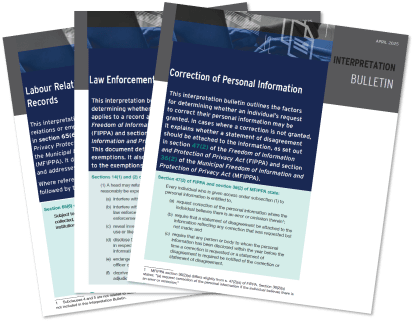Enhancements to Tribunal efficiency and responsiveness

Digital artwork by Amy Jiao of Surface Impression, commissioned for the IPC’s Transparency Showcase.
Over the past five years, the IPC has seen a 30 per cent increase in incoming files, rising from 2,768 in 2020 to a record high of 3,613 in 2024. Despite this significant growth in caseload, we have made substantial improvements in efficiency, ensuring that Ontarians receive timely resolutions to their privacy and access concerns.
In 2024, the IPC closed 3,084 files, marking the highest number of closures in IPC history. Of those, 2,719, or 88 per cent, were successfully resolved or dismissed through early resolution, expedited process or mediation, avoiding the need for lengthy adjudication. At the same time, we reduced the average time to resolve access appeals by 8 per cent, from 10.7 months in 2023 to 9.9 months in 2024. Average time to resolve privacy complaints saw an even greater drop in average processing time of 9 per cent, from 5.9 months to 5.4 months. We managed to reduce the backlog by more than 17 per cent from the beginning to the end of 2024.
Looking ahead, we will continue to build on these efficiencies to manage growing demand while maintaining the highest standards of service.
Closed files in 2024
Files successfully resolved or dismissed through early resolution, expedited process or mediation
New tribunal processes for a digital future
On September 9, 2024, we introduced a wholesale review of our Code of Procedure, with related practice directions and policies, for processing appeals under FIPPA and MFIPPA. The purpose of this review was to reflect the IPC’s current and planned operations for considering appeals; improve timeliness of processing of appeals; maintain the fair, just, and expeditious consideration of appeals; and provide greater transparency and understandability of our processes and procedures, including timelines, so parties know what to expect.
One key improvement in the revised code is our new expedited process for handling straightforward issues. Our new expedited process reduces processing times by streamlining the handling of preliminary or interlocutory issues through a single-person processing model from start to end. This new process has greatly enhanced our efforts to resolve files quickly and ensure faster outcomes for Ontarians. Since it began operations in March 2024, the expedited team successfully closed 619 files. Compared to before, average time to resolve reasonable search files has been reduced by 117 days, fee-related files have been resolved up to 193 days faster, and interim decisions are wrapping up 161 days sooner. We’ve also reduced the time to resolve failure to disclose files by 107 days and failure to provide access files by 123 days.
The code, policies, and procedures were also updated to reflect our new e-appeals process that we introduced in 2022. This new, digital-friendly way for individuals to file complaints and appeals and to pay for them online is working to reduce processing times and increase efficiencies. In 2024, 73 per cent of incoming appeals came through our e-appeals process, up from 71 per cent in 2023.
Among other updates, the code also introduces a new requirement for parties to disclose when they have used AI tools to prepare their submissions. Parties must now disclose to the IPC if AI was used, the type of AI, and how it was applied. Where AI is used to prepare submissions, parties must review the accuracy and content of any legal references or analysis and certify in writing that they have completed that review.
Tribunal orders and decisions: summaries made simpler
As part of our efforts to improve and modernize, we have prioritized making our orders and decisions clear and accessible for all Ontarians. Through ongoing training and quality assurance reviews, we’ve prioritized plain language writing to ensure they are clearly understood by all parties.
Our efforts are bearing fruit. In 2024, we contracted third party experts in plain-language legal decision-writing to evaluate a sample of our decision summaries. The average overall score for readability and accessibility of this year’s sample was the equivalent of 8.13 on a fifteen-point scale, showing a slight improvement from last year. The distribution of scores across samples was also more concentrated, suggesting greater consistency in summary writing.
Demystifying access and privacy law: IPC’s interpretation bulletins and FYI video series

Throughout 2024, the IPC added to its suite of interpretation bulletins to promote a greater understanding of Ontario’s access and privacy laws. These bulletins are intended to help individuals and institutions better understand how the IPC and the courts have interpreted various sections of FIPPA and MFIPPA.
By codifying these interpretations and making them readily available on the IPC’s website, we can help institutions respond more effectively to information requests from the outset. These interpretation bulletins also allow parties to an appeal know more clearly what to expect earlier on during our informal resolution process, helping to avoid protracted disputes having to go all the way through adjudication.
To further enhance accessibility, the IPC launched a new IPC FYI Appeal Process video series to provide short, engaging explanations of key tribunal appeal processes. The four videos, released in 2025, walk Ontarians through the appeals process — intake, expedited process, mediation and adjudication. These videos, available in English and French, are complemented by glossaries, infographics, and other online resources to support public understanding.
By combining clear, written guidance with dynamic video content, we are modernizing the way Ontarians engage with access and privacy law, making our processes more transparent, accessible, and user-friendly than ever before.



